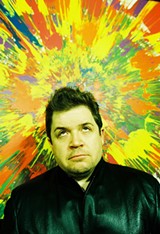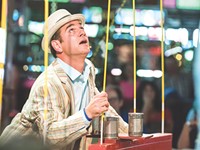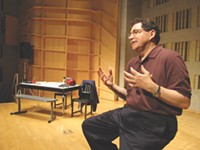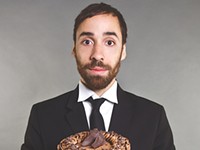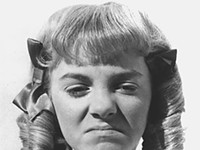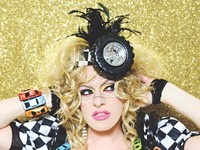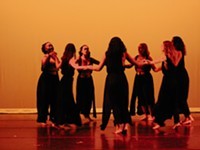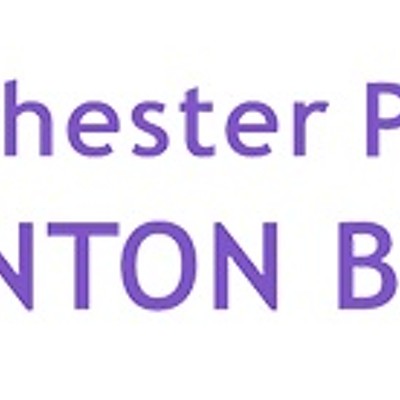[
{
"name": "500x250 Ad",
"insertPoint": "5",
"component": "15667920",
"parentWrapperClass": "",
"requiredCountToDisplay": "1"
}
]
Comedian Patton Oswalt discusses philosophy, comedy, and how stand-up will always be his mainstay
When Patton Oswalt headlined the initial First Niagara Rochester Fringe Festival in 2012, he was already a television star best known for his role on "The King of Queens," an actor in films like "Young Adult," and a voice actor, playing Remy in the animated film "Ratatouille."
Since then Oswalt, who returns to headline this year's Fringe with a Kodak Hall at Eastman Theatre show Friday, September 16, has made more movies, appeared on "Veep," "Portlandia," and "Modern Family," and won a Critics' Choice Television Award in 2013 for his guest appearance on "Parks and Recreation." He's also released his second book, "Silver Screen Fiend: Learning About Life from an Addiction to Film."
Despite his busy TV and film schedule, Oswalt continues to perform stand-up comedy around the country, and last month, he was nominated for an Emmy Award for Outstanding Writing for a Variety Special for his Netflix stand-up special, "Patton Oswalt: Talking for Clapping."
While his career has flourished, Oswalt's recent personal life has been painful. His wife of 10 years, true crime writer Michelle McNamara, died in her sleep this past April at the age of 46.
City recently caught up with Oswalt by phone and talked about a variety of subjects, from his early comedy influences to his current fascination with philosophy. The following is an edited transcript of that conversation.
City: In your book, "Silver Screen Fiend," you describe memorizing entire comedy albums as a teenager. Who is in your pantheon of great comics?
Patton Oswalt: George Carlin, especially the stuff off of "Class Clown" and "Occupation: Foole" because it's so well written, and it's written with the thought of words having impact in mind. So it's very easy to memorize.
Unfortunately, he's a horrible person, but my god, what a great comedian: Bill Cosby, especially the album "Revenge," because it's almost like music.
Weirdly enough, I didn't really ever memorize that much Richard Pryor because he's so himself, it's so another-person-talking that you end up more paraphrasing the amazing stuff he was saying rather than reciting it back. And of course your standards: Monty Python, Steve Martin, and stuff like that — people who really understood language and how it could be used for that maximum "BOOM!" effect.
Your descriptions of your rookie years doing stand-up are pretty brutal. How did you manage to stick with it?
I've never figured that out. I've never figured out why, of everything else I've ever tried, comedy, which could not have given me less encouragement and had more aggressive, negative, "don't come back" — I just kept coming back. I don't know what it was.
At this point, you've been successful in television and movies; why do you return to stand-up?
I never leave stand-up. That's the through-line; everything else is just these fun little side roads that I get to do along the way of doing stand-up. It's not like I go, "Well, I'm going to quit stand-up and just do movies," and say, "Ah, darn it, I've got to go back." I never stop doing stand-up; I never stop thinking in terms of jokes. I never stop thinking in terms of when am I going to get on stage, when's my next show.
Most arts are secondary: you're playing a character in a show, or representing something in a sculpture or painting. Comedy seems like the one art form where there's little separation between the performer and the actual person. Is it that personal, or is that an illusion?
It depends on the comedian. Some comedians are very confessional and very personal, like me. Other comedians just do jokes, whatever makes them most comfortable in expressing themselves. I get personal, but I hope people understand that they're seeing a one-hour slice of a 24-hour-a-day life, and as honest as I try to be, that's not a full portrait of who I am.
You take comedy seriously and consider it an art form. But it's an art form often done in front of drunks. How do you feel about hecklers?
Whether or not people respect comedy or not — I've just stopped worrying about that. It's very hard to separate the crowd from the art and look at the actual art. I think it's as valid a storytelling art form as anything — literature or television — especially if it's done well.
You are incredibly funny, but mixed in with the jokes are real issues dealing with serious subjects, like the use of religion to accentuate differences between people. Are audiences offended when you talk about religion that way?
They don't get as offended as they used to. I always try to couch my stuff in the idea that even if I'm making a pronouncement about something, it comes from me questioning it rather than condemning it and telling people who are into it that they're idiots.
I'm not trying to speak from on high in a lecture-y way. It's more like hey, I have all these questions about this thing and none of these questions are being answered. It seems a little silly to me.
Also, I'm an atheist that's very happy that religion exists. I'm not one of those we've-got-to-wipe-out-all-religion people. I'm glad that other people told and made up stories to explain the world to them. I think that that's actually a beautiful thing, and I think that that's one of the best things that humans do that sets us apart from animals. We're able to tell stories.
You also have some social consciousness embedded in your comedy, like your critique of the use of animals in circuses. Can comedy have an impact on society?
Absolutely. Comedy can. Society is having an impact on us, and then, we're the reaction to it. And then that reaction can cause society to go a different way.
In the past you've gotten pretty deeply into politics. How do you feel about our current election?
I'm a combination of very entertained and very frightened. When Hillary picked her vice presidential choice, a writer named Louis Virtel wrote: "I was worried that Tim Kaine was too boring and then I remembered entertainment is what got us into this mess."
That idea that this is really interesting — Donald Trump — part of you wants to say, "You want to be entertained in 2016 when all it is is entertainment? F*** you!" I think politics should be a little boring. I don't think every single day there should be some crazy entertaining thing happening.
Jerry Seinfeld declared a while ago that he will not play colleges anymore because there is too much political correctness. Do you ever worry about that?
No. As long as your stuff is funny, even if someone is offended, you hope they say, "Oh, I don't agree with that, but it's funny." Also, this PC thing is nothing new. The only thing that's new is now they have platforms like Twitter to vent their frustrations.
But there was always a segment of the population that just does not like comedy, does not have a sense of humor, and gets angry when they see comedy about anything. There was always that section of the audience that said, "I don't think that's funny, I don't think that's funny at all." But now they have a way to vent that.
You have not been hesitant to plunge right into controversies like the recent one about whether it's ever appropriate for a comedian to tell a rape joke.
A lot of the controversy is hilarious to me. For the first time we have these people who are building a career on telling people not to make jokes. That, to me, is like a Lewis Carroll level of insanity. It cracks me up.
Is anything taboo?
No! No! With context nothing is taboo. And keep in mind the thing that brought down an actual, real-life rapist like Bill Cosby was a comedian making a rape joke about him!
Comedians these days make us think deeply about our lives. Are comedians like you in some ways modern day philosophers?
I would have taken that as a compliment a year ago, but I've started reading philosophy, and whoa! ... I am really not thinking as deeply as these guys.
I'm going to so disagree with that only because I'm reading Camus's "The Rebel" and David Hume's "A Treatise of Human Nature," and if an apple is a philosophical question, a philosopher takes apart the skin, the stem, the core — he peels the husks off and carves it out, and looks into it. A comedian just finds the juiciest slice that can — "BOOM!" — make you think that's a great tasting apple. So to say that we're modern day philosophers is an insult to philosophy.
I can make people begin to think, but it takes a philosopher to make that person want to take a journey, and take that journey long enough that when they end that journey, they're then able to walk themselves. At best, I'm trying to get people to think and then agree with me, and then I want to move on. A philosopher dwells. That dude goes deep, and maybe some comedians are philosophers. But it's like some people say comedy is like jazz. No it's not.
Well the improvisational element is there if you're quick-witted enough to come up with something on the spot, so it's a little like a jazz solo.
No it's not. Jazz is jazz; comedy is comedy. A wedding cake has sugar in it. That doesn't make it a bottle of coke.
Okay, well then I have to ask, what's a comedian doing reading philosophy?
I love to read. I read a lot, and I want to keep expanding my head, I guess. It keeps you feeling young and limber and it makes you ... Especially when you read really great work, it's a way to slow down time, because as you get older you have less and less totally brand new experiences, so when you pick up some piece of writing by an author with an incredibly strong voice, it slows your life down a little.
You can enjoy more time and live a whole other life. The more books you read, the more lives you get to live, including your own. It feeds into your own life. In other words, my life is not a function of my art. Obviously I love doing stand-up, but I also want to live a full life. I don't want to just do stand-up. I don't want every action of every day just to be in my stand-up career.
What does the Emmy nomination mean to you?
It means I get to do more stand-up, I hope. Everything that I do in the business, if I get an award or a nomination, it just means I'm being recognized in the company of some really amazing people that I look up to, like John Mulaney, Tig Notaro, and Hannibal Buress. That's really important to me.
You have recently experienced a devastating tragedy. Will that have an effect on your comedy?
I don't know yet. I haven't gone back on stage. I'll let you know later.
Is there anything you would recommend to people in terms of how to deal with something like this?
Lean on your friends.
In an essay that you wrote about losing your wife, you quoted your 7-year-old daughter saying something incredible. "When your mom dies you're the best memory of her. Everything you do and say is a memory of her."
When she said that that morning it really kind of blew me away. Was she channeling something? I don't know; that was amazing.
In This Guide...
Speaking of...
-
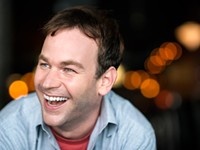
Mike Birbiglia works out the story
Jul 12, 2017 -
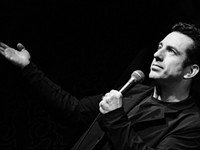
Comedian Jamie Lissow brings it home
Sep 21, 2016 -
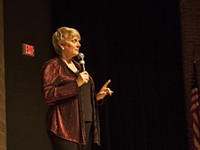
Rebecca reviews 'Confessions of a Prairie B;+@h,' and Patton Oswalt
Sep 17, 2016 - More »
Latest in Rochester Fringe Festival
More by Ron Netsky
-

Album Review | 'Bizet: Carmen in Jazz'
Mar 26, 2024 -
'To Swing Is the Thing" by Mike Melito
Aug 10, 2023 - More »
